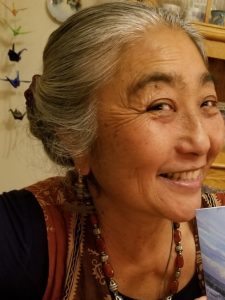I am Sansei, a third-generation Japanese-American who did not experience the hardship and humiliation of being rounded up without due process and imprisoned for three to four years as my elders did. But I did experience the racism and xenophobia in the 1950s in the aftermath of war.

Refugees fleeing violence from their homelands south of our border are now being locked up in immigration detention centers that are intentionally located in isolated sites. Americans should be ashamed that these men, women and children are being imprisoned in our country with the threat of being sent back to where they might be killed.
And we must be hyper-attentive to the Trump Administration’s threat of a Muslim ban.
Earlier this year, I shared from this perspective as a member of a panel of Survivors of Japanese American Incarceration Camps of World War II. We spoke at an event celebrating the current exhibit at Chico State’s Valene L. Smith Museum of Anthropology, “Imprisoned at Home.” (The museum’s website notes that after the bombing of Pearl Harbor, 120,000 people, including Americans of Japanese descent, were taken to “War Relocation Centers.”)
The survivors are now in their 80s and 90s and so it is vitally important that we hear their firsthand stories. Gridley’s Jim Tanimoto, 96, is featured in a film that is available to view at the exhibit entitled “Reflections on Civil Liberties, the Story of Japanese-American Mass Incarceration.” I encourage readers to check out the exhibit that will be up until Aug. 2 that highlights the Tule Lake camp.
When I was 5, a family circulated a petition to keep our family from moving into what became our neighborhood in the San Fernando Valley.
I was the first Japanese-American student in my elementary school and was traumatized by the subtle and not-so-subtle prejudice of being seen as a postwar “enemy race.” Another third-generation panelist also had similar experiences that he shared when other young students told him that they didn’t want to play with “Japs.”
I took the opportunity of being invited to participate on this panel to ask my aunts and uncles for stories that they wanted me to share. My Aunt Virginia told me that most American history books failed to report that not one spy was found during the period of time of their incarceration. The museum exhibit includes a propaganda movie shown to the public during the incarceration of the Japanese-Americans.
Propaganda is a powerful tool, and the anti-Japanese sentiment lingered during my childhood. World War II movies celebrating American victory persisted. Some Americans still believe that patriotism includes allowing racism, xenophobia and cruelty.
Ancestral emotional wounds can be passed down from generation to generation in insidious ways — from invisibility to self-denigration, shame and humiliation.
There were courageous internees such as Korematsu, Hirabayashi, Yasui, Kashinagi Yamaichi, Endo and the other “No-No Boys” who resisted the unconstitutionality of violations of their civil liberties and were jailed and sent to the Tule Lake camp.
“We were Americans!” Tanimoto exclaimed many times during his talk on the panel. “We had Constitutional rights.”
There are bills pending in Congress addressing the danger of this type of roundup of people happening again. The Korematsu-Takai Civil Liberties Protection Act of 2017 would prevent imprisonment or detainment based solely upon protected characteristics, such as race, ethnicity, religion, gender identity or sexual orientation.
A 2016 report by the Southern Poverty Law Center, “Shadow Prisons: Immigrant Detention in the South”, says, “…detainees are routinely denied their due process rights and frequently endure inhumane conditions in isolated facilities that have little oversight from the federal government.”
It goes on to say: “An expansion of the immigrant detention system threatens to greatly exacerbate the mass incarceration crisis in America. And it would violate our nation’s basic values and cement our reputation as a country intolerant of immigrants.”
This mirrors too closely to what my elders experienced in this country’s history. We must not allow this to continue.
Diane Suzuki is a long-time resident of Chico, an activist, coordinator of Beyond Violence Alliance, a KZFR programmer and a massage therapist.

Thank you Diane Aiko, for this powerful connecting of that shameful chapter in American history during WWII, and what is happening today. I am so sad for the little 5 year-old Diane who had to endure such cruel racism. Such a world we live in when so many people are still filled with hatred of “the other”. Thank you, ChicoSol, for running this article!
Very important for us to hear about this, and to recognize that human nature has not changed, and we need to be on guard against mindless cruelty and exclusionary attitudes.
Dear Diano Aiko Suzuki,
I was very interested to read your article (more than a year after it was published, as it’s almost 2020!). I have a friend in Portland, Oregon, Peggy Nagae, who was a lawyer for Minoru Yasui in the Korematsu /cases of some years ago…I met you years ago, at CSUN, and had long wondered what had happened to you (I live in Japan now). It think your political activism is wonderful and truly admirable.
P.S. Sorry for the typos. I meant “Korematsu / Yasui cases”, and “I think [not It think] your political activism is wonderful and truly admirable.”